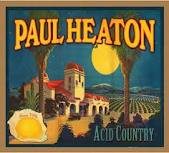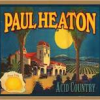 Originally published by L.S. Media. Sept 22nd 2010.
Originally published by L.S. Media. Sept 22nd 2010.
Acid Country is the new studio album by one of music best wordsmiths. Paul Heaton has made a living from his use of intelligent and interesting lyrics set alongside some of the most upbeat music over the last couple of decades, whether from his time in the eighties with the Housemartins or in later years with the impressive and chart toppers The Beautiful South.
Now on his second solo album, Paul has once more reached the musical highs that are associated with him and produced an album full of charm and his own personnel stamp emblazoned throughout.
The album kicks off with The Old Radio, an almost nostalgic look at the medium’s finest hours of reporting and highlighting music that would change the world. With its loving references towards Martin Luther King, its raised eyebrow to Ginger Rogers and its look at musicians such as the Ink Spots and Elvis Presley, it is a touching homage to the force of the old style transistor.
The album never misses a chance to poke fun at those that deserve it and there are some superb references to that effect in songs such as Welcome to the South and This House. The music that accompanies each song is sweet and sincere and a joy to listen to and each musician that has taken part on the album should take a copy of this album wherever they go just to point on that it was them that took part in it.
Truly adored by his legion of fans for his subtle wit and well observed lyrics, Paul manages to do what so few other musicians and song writers can hope to achieve. By simply looking at the world around him, Paul gets the message across that his anger at some of life’s injustices and wrongs can be sang about in a scything and intellectual way without having to resort to the grumpy old man stereotype.
This album is one of Paul’s finest moments and worth the money completely, reverential in parts, beautifully ironic in others. An album to treasure and one of the best I have heard this year so far.
Ian D. Hall
